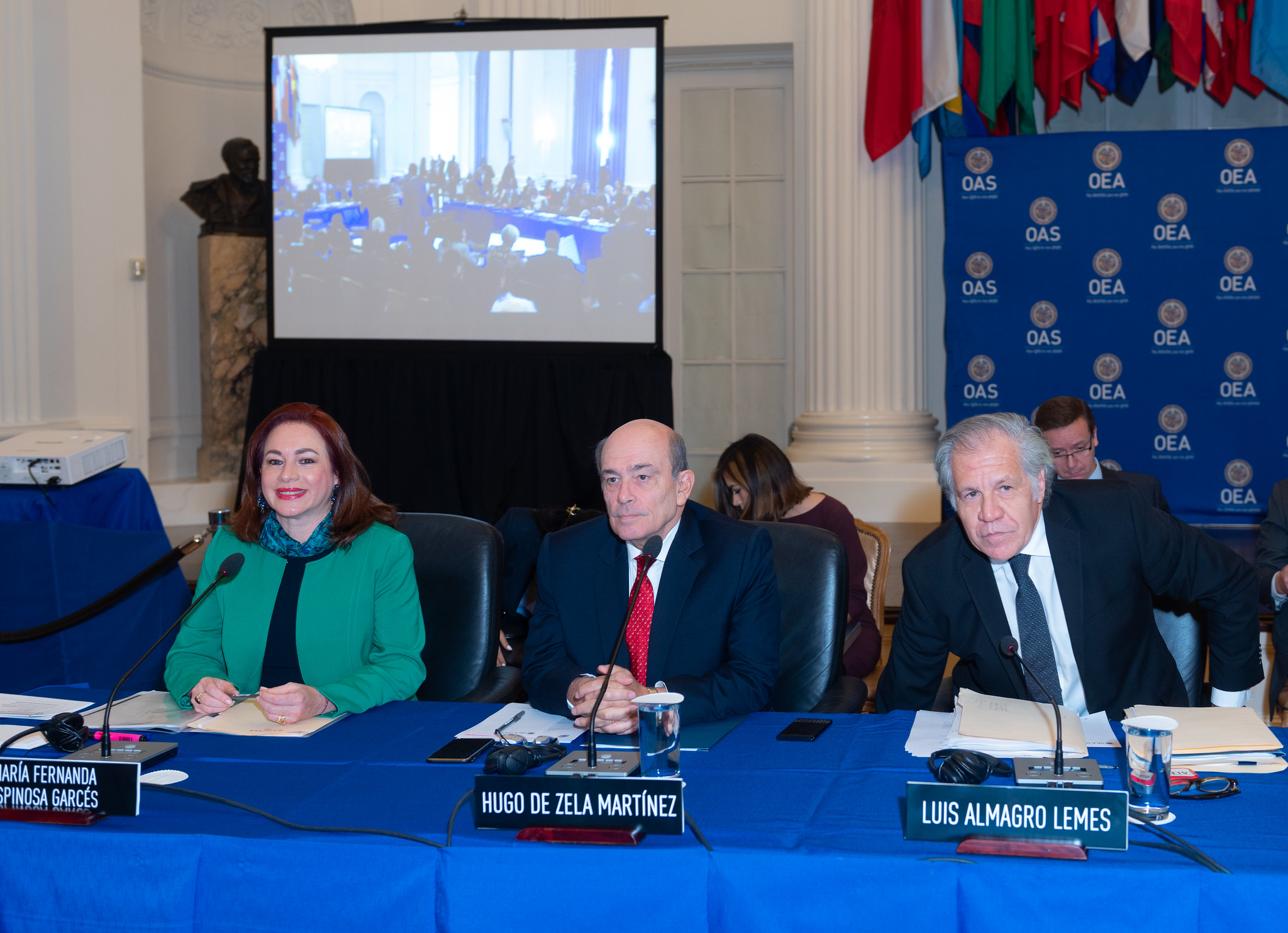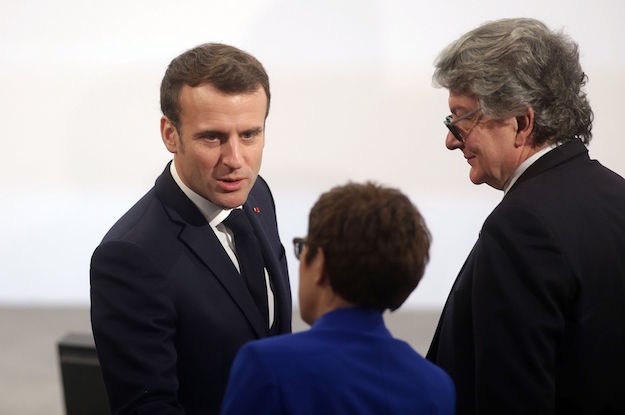Since its founding in 1948, the Organization of American States (OAS) has been viewed in Latin America alternately as a puppet of the U.S. or an indispensable eyewitness, an irrelevant bureaucracy or an invaluable resource. Sometimes, it’s been all of the above. But over the last five years, a different moniker has come to define the organization: polarized.
With the region divided over how to react to Venezuela’s implosion, some member states have lauded Secretary General Luis Almagro’s hard stance toward Nicolás Maduro as a necessary line in the sand. But others deride the secretary general for what they see as wasting the OAS’ richest asset: its ability to be an impartial moderator. Some also fear that the focus on Venezuela has diverted the organization’s attention from other priorities.
In short, opinion is divided over Almagro’s tenure. But both those who believe he has awakened the OAS from a bureaucratic slumber, and those who see his time in office as a string of broken promises, will have a chance to make their opinions felt on March 20, when the OAS elects its next secretary general.
Although he initially pledged not to run for a second term, Almagro has decided to seek re-election. Two candidates will oppose him. The first is María Fernanda Espinosa, a former foreign relations and defense minister from Ecuador who served as president of the UN General Assembly until September 2019. Espinosa was nominated for the position by Saint Vincent and the Grenadines and Antigua and Barbuda, as Ecuador’s President Lenín Moreno pledged his support for Almagro’s re-election. (Almagro was similarly nominated not by his native Uruguay, but by the Colombian delegation.)
The second is Peru’s ambassador to the U.S., Hugo de Zela, who knows the OAS well after serving a total of 16 years over two stints as the organization’s chief of staff and one as Peru’s permanent representative.
AQ invited all three to explain why they should serve as the OAS’ next secretary general; both Espinosa and De Zela accepted the offer. The following excerpts of their responses have been edited for length and clarity.
AQ: Why are you running to head the OAS?
Hugo de Zela: In this region we have traditionally tried to solve our problems through dialogue, but today there is a tendency to take a stance at the extremes, and we have seen this trend in the OAS as well. I don’t think this is positive. We have to deal with problems through negotiations and look for effective solutions through dialogue. The other two candidates each represent one extreme, and I represent an institutional vision. It isn’t about my personal view, it is the view of my country. I am the only candidate that was nominated by his own country and Peru has always held a view of finding solutions through peaceful means.
María Fernanda Espinosa: To be honest, this wasn’t in my plans. But governments from the Caribbean reached out to me to say that they thought a change in leadership at the OAS was needed. The organization needs to refresh and revitalize its work, connect to the challenges that the hemisphere is facing right now, refresh its agenda, improve management and increase dialogue with institutions and organizations outside the hemisphere. Global problems require global answers – and I have the credentials necessary to take this challenge. I’ve done it with 193 states as president of the UNGA. Ambassador De Zela has a lot of experience, and knows the OAS well. This can be an advantage, but it can also be a disadvantage.
AQ: Will Venezuela continue to be a priority?
De Zela: We need the OAS to respond to major challenges in the region, and help us solve conflicts. It was created as a meeting space, and political dialogue is the only tool we have to reach accords of significance. We created the Lima Group (in 2017) because at that point it was clear that the efforts of different international bodies – Unasur, CELAC and the OAS itself – had failed to yield results and instead created a vacuum. The Lima Group always had the objective – and still does – of finding a solution without using force. This has to be a Venezuelan solution, led by Venezuelans and supported by the international community.
Espinosa: Venezuela has become the main factor of polarization in the hemisphere, while the measures taken (to address the crisis) have not yielded the needed results. Our goal is the well-being of the Venezuelan people, to prevent migration and help strengthen democratic institutions, and we have not achieved that. We can’t continue to do the same thing and expect a different result. We need to start a new chapter where the OAS is part of the solution, but not the only actor.
Venezuela worries us all, we need to face it and work on it, but it can’t take over the entire OAS agenda. It has been almost a singular focus and has taken 80% or more of the political energy of the organization. Our region last year had moments of tension in many countries, so I am proposing a mediation and prevention team of on-call specialists to help see things from the outside and look for fresh perspectives.
AQ: What will be your top priority if elected?
De Zela: First, I want to talk with member countries. What the OAS Charter says is that priorities are set by member countries, not by the secretary general. So I want to talk to countries, agree on priorities, then design an action plan to reach the objectives defined by members in the fastest way possible.
Espinosa: I have a motto, which is to build unity within diversity. It would be naive to say we all have to think alike. We are different, have different political systems and economic priorities, but we can build an agenda of common denominators. And a secretary general needs to serve the organization’s members. She or he needs to be more secretary and less general. The mandate comes from the permanent council and the general assembly, so while the secretary general needs to display leadership and initiative, he or she should not be an ideologue or opinionated. Whoever is in that role needs to be impartial, look for common ground, and most importantly act strictly under the charter, and the jurisprudence and norms of the OAS, international law and the UN charter.
AQ: How will you keep the OAS relevant?
De Zela: We have to distinguish between two concepts: relevance and effectiveness. I think the organization is relevant when it is effective. My orientation is not to reach out to the media so often, and instead to look for effective results to solve the problems of our member countries. I think the OAS has the tools to do that and has shown as much on multiple occasions. I participated personally in important moments such as the solution of the Central American crisis in the 1990s, coups that were resolved with OAS support, such as in Haiti in the same decade, and later in Guatemala when its congress was closed. These are three concrete examples of active participation of the organization in finding effective solutions for problems, and which I had the privilege to be part of. The OAS has the tools and can solve problems, but you need to know how to do it.
Espinosa: We have to see the four pillars defined by the OAS Charter as interconnected, interdependent. Many member countries see cooperation to reach their development needs as a priority. But we can’t have development without peace, nor can we have peace without development. And there are many challenges when it comes to security in the hemisphere that in large part need a preventive focus. Electoral observation is a comparative advantage for the OAS, but I believe this job has to be done with surgical precision. There are also themes impacting the whole hemisphere, such as migration, where the OAS can act as the perfect umbrella for joint initiatives. Another major contemporary crisis is the environmental crisis. These are all themes that can unite the hemisphere. What is needed is a positive agenda, one that generates mutual trust and heals the current polarization. In my year as president of the UNGA, I took time to listen to all states, all 193 of them. We had many situations of high conflict, but my role as president was precisely to sit everyone at the table and find common ground. I believe that all countries felt heard and treated justly; this requires impartiality and an enormous capacity to be a bridge, and not a factor of division and polarization.









